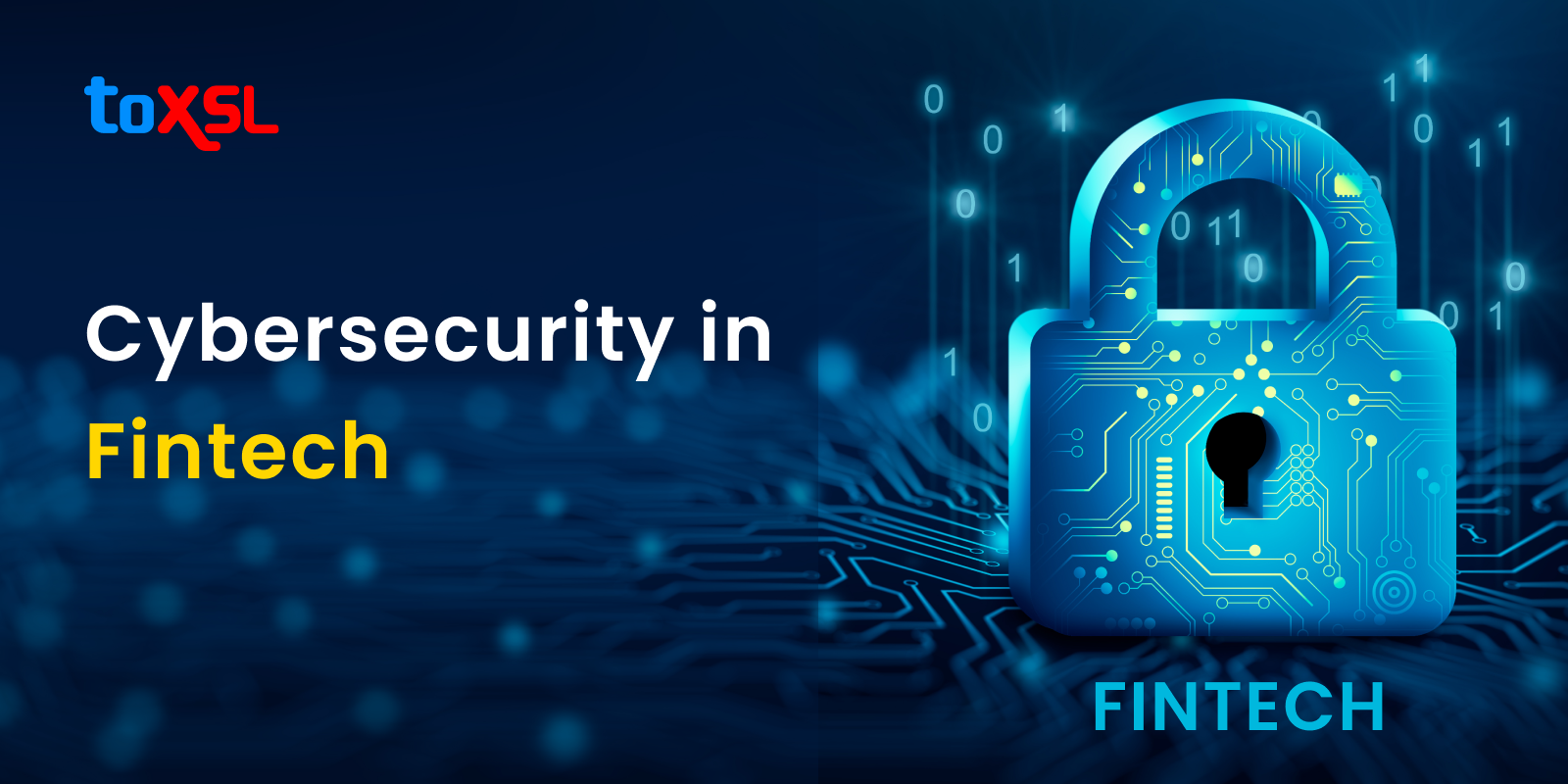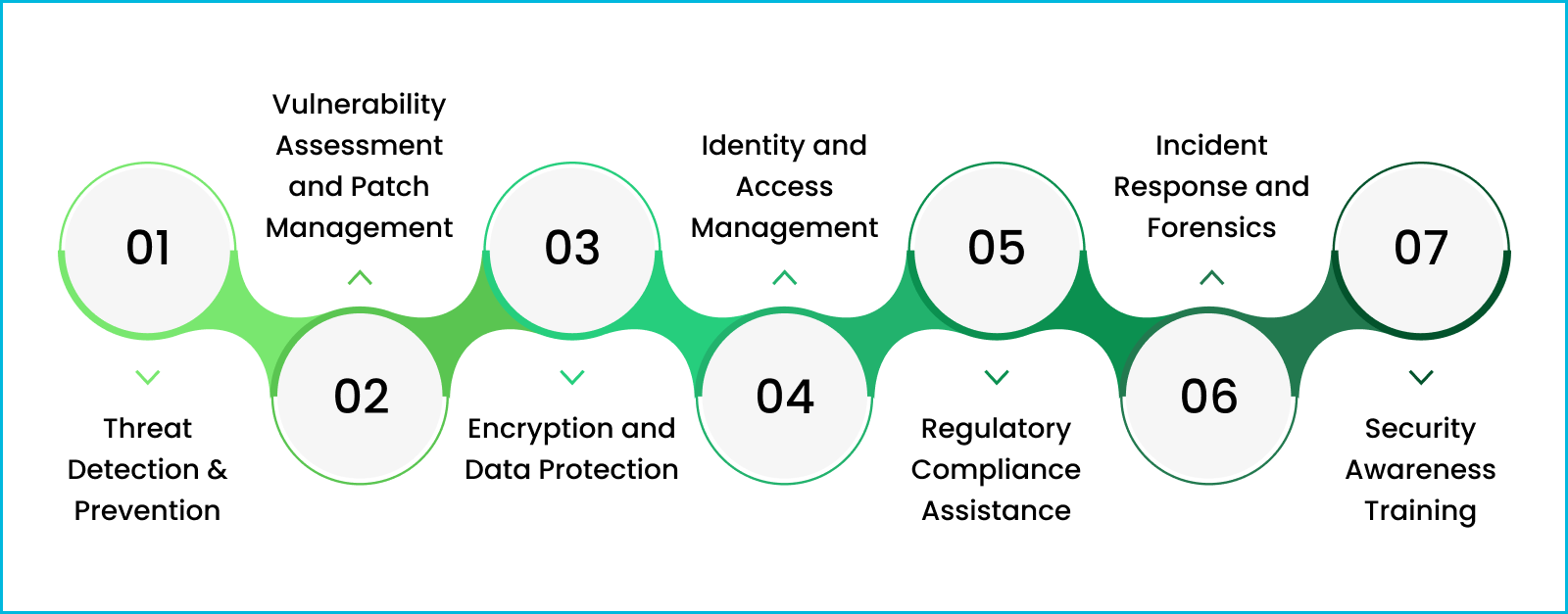- May 23, 2024
- Others
- 3627
Share this post on:

Over the past few decades, the fintech industry has transformed dramatically. According to market research, the global fintech market is estimated to reach a value of 556.58 billion by the year 2030, with a compound annual growth rate (CAGR) of 19.50% throughout the forecast period.
The above-mentioned stats indicate the growth of the fintech business, but this growth also enhances the criticality of cybersecurity in the fintech industry. Cybersecurity software solutions help businesses protect their data and enhance customers’s confidence in investing in their fintech app development services. But, before opting for any cyber security services, it is essential to clear a few questions, such as:
1.) How to build a secure fintech application?
2.) How can cybersecurity services help secure fintech?
3.) What are the cybersecurity threats in fintech?
4.) What are the regulations and policies in fintech?
5.) Why is cybersecurity important in fintech industry?
Continue reading the blog to get the answers to all these questions.
Cybersecurity in Fintech: How to build a Secure Fintech App?
Want to ensure security in fintech? Businesses can ensure security in their FinTech apps by building a secure FinTech app. As fintech continues to transform the way we manage finances, building a secure fintech app is not just a necessity but a cornerstone of trust and reliability. Let’s delve into the essential steps and considerations involved in crafting a secure fintech application.

1. Understanding the Landscape
Before diving into the development process, it's crucial to grasp the intricacies of cybersecurity in the fintech realm. The fintech market
offers a wealth of opportunities but also presents unique challenges in terms of cybersecurity. Collaborating with a reputable cybersecurity company can provide invaluable insights and expertise tailored to the region's specific cybersecurity landscape.
2. Partnering with Cybersecurity Experts
Engaging the services of a trusted cybersecurity company is a strategic move for fintech firms embarking on app development. These companies offer specialized cybersecurity services that cater to the intricate needs of fintech applications. From risk assessments to penetration testing and security consulting, partnering with a cybersecurity firm ensures that security remains a top priority throughout the development lifecycle.
3. Integrating Cybersecurity Software Solutions
Incorporating robust cybersecurity software solutions into the app development process is fundamental to fortifying the security of fintech applications. These solutions serve as proactive defenses against a myriad of cyber threats and vulnerabilities. Key cybersecurity software solutions include endpoint security, encryption, and multi-factor authentication (MFA), among others.
4. Collaborating with Fintech App Development Companies
Selecting the right fintech app development company is instrumental in building a secure fintech application. Fintech app development companies possess the expertise and experience to seamlessly integrate security features into the application architecture. By collaborating closely with fintech app development experts, organizations can ensure that security considerations are ingrained in every aspect of the app's design and functionality.
5. Implementing Fintech App Security Solutions
Building a secure fintech app entails implementing a comprehensive suite of security solutions tailored to mitigate the unique risks associated with financial transactions and sensitive user data. Some essential fintech app security solutions include:
Secure Authentication Mechanisms: Implementing strong authentication methods such as biometrics or token-based authentication to verify user identity and prevent unauthorized access.
Data Encryption: Employing robust encryption protocols to safeguard sensitive data, both at rest and in transit, thereby preventing unauthorized interception or tampering.
Real-time Monitoring and Incident Response: Leveraging advanced monitoring tools and protocols to detect suspicious activities or security breaches in real-time, coupled with a well-defined incident response plan to mitigate potential threats swiftly and effectively.
Best Practices to Ensure Cybersecurity in the Fintech Industry
In an era where financial transactions are increasingly conducted online, the importance of cybersecurity in the fintech industry cannot be overstated. Fintech firms handle vast amounts of sensitive data, ranging from personal banking information to investment portfolios, making them lucrative targets for cybercriminals. To mitigate risks and maintain trust in the digital ecosystem, fintech companies must adhere to robust cybersecurity practices. Let us explore some of the best practices to ensure cybersecurity in fintech industry.

1. Implement Strong Authentication Mechanisms
One of the fundamental steps in securing fintech platforms is implementing multi-factor authentication (MFA) mechanisms. By requiring users to provide multiple forms of verification, such as passwords, biometrics, or one-time codes, fintech companies can add a layer of security to their systems, reducing the risk of unauthorized access.
2. Encrypt Data at Rest and in Transit
Encryption is paramount for protecting sensitive data from interception and unauthorized access. Fintech firms should encrypt data both at rest, when stored in databases or servers, and in transit, during transmission between devices and networks. Implementing robust encryption algorithms ensures that even if data is compromised, it remains unintelligible to unauthorized parties.
3. Conduct Regular Security Audits and Penetration Testing
Proactive measures, such as regular security audits and penetration testing, are essential for identifying and addressing vulnerabilities in fintech systems. By simulating real-world cyberattacks and assessing the effectiveness of existing security measures, companies can strengthen their defenses and preemptively mitigate potential risks.
4. Maintain Strict Access Controls
Limiting access to sensitive data and system resources is critical for preventing unauthorized individuals from exploiting vulnerabilities. Fintech firms should adopt the least privilege principle, granting employees and third-party vendors access only to the resources necessary for their roles. Additionally, implementing robust identity and access management (IAM) solutions helps enforce access controls and monitor user activity.
5. Stay Abreast of Regulatory Requirements
The fintech industry is subject to stringent regulatory frameworks aimed at safeguarding consumer interests and data privacy. Fintech companies must stay abreast of evolving regulatory requirements, such as GDPR, PSD2, and PCI DSS, and ensure compliance with applicable standards. Failure to adhere to regulatory mandates not only exposes firms to legal liabilities but also undermines trust in their ability to protect customer data.
How can Cybersecurity services protect Fintech?
Cybersecurity services play a crucial role in protecting fintech firms from a wide range of cyber threats, ensuring the integrity, confidentiality, and availability of sensitive financial data. Here's how cybersecurity services can safeguard the fintech industry:

1. Threat Detection and Prevention:
Cybersecurity services employ advanced threat detection mechanisms, such as intrusion detection systems (IDS) and intrusion prevention systems (IPS), to identify and mitigate potential security breaches in real-time. By monitoring network traffic and system logs for suspicious activities, these services can proactively thwart cyberattacks before they cause significant damage to fintech platforms.
2. Vulnerability Assessment and Patch Management:
Cybersecurity services conduct regular vulnerability assessments to identify weaknesses in fintech systems and applications. They then provide recommendations for remediation and assist in implementing security patches and updates to mitigate known vulnerabilities. By staying ahead of emerging threats and software vulnerabilities, fintech firms can reduce the risk of exploitation by cybercriminals.
3. Encryption and Data Protection:
Cybersecurity services help fintech companies implement robust encryption protocols to safeguard sensitive financial data, both at rest and in transit. By encrypting data using industry-standard algorithms and secure key management practices, these services ensure that even if data is intercepted or compromised, it remains unintelligible to unauthorized parties, maintaining the confidentiality of financial transactions.
4. Identity and Access Management (IAM):
Identity and access management solutions offered by cybersecurity services enable fintech firms to enforce strict access controls and authenticate users securely. By implementing multi-factor authentication (MFA) mechanisms, role-based access controls (RBAC), and privileged access management (PAM) policies, these services prevent unauthorized individuals from gaining access to critical systems and resources.
5. Regulatory Compliance Assistance:
Fintech firms are subject to stringent regulatory requirements aimed at protecting consumer data privacy and ensuring the integrity of financial transactions. Cybersecurity services assist fintech companies in navigating complex regulatory frameworks such as GDPR, PSD2, and PCI DSS, ensuring compliance with applicable standards and regulations. By adhering to regulatory mandates, fintech firms can mitigate legal and reputational risks associated with non-compliance.
6. Incident Response and Forensics:
In the event of a security breach or cyberattack, cybersecurity services provide rapid incident response capabilities to minimize the impact and mitigate further damage. These services conduct forensic investigations to determine the root cause of the incident, identify compromised systems, and develop remediation strategies to prevent future breaches. By leveraging their expertise in incident response and forensics, cybersecurity services help fintech firms recover quickly from security incidents and maintain business continuity.
7. Security Awareness Training:
Cybersecurity services offer comprehensive security awareness training programs for employees and end-users of fintech platforms. These training sessions educate stakeholders about common cyber threats, phishing scams, and best practices for safeguarding sensitive information. By fostering a culture of security awareness, fintech firms can empower their workforce to recognize and mitigate security risks proactively.
Fintech Cybersecurity App Development Cost
The cost of developing a fintech app hinges on various factors, including the complexity of features, platform compatibility, regulatory compliance requirements, and, importantly, cybersecurity considerations. While prioritizing security may entail additional expenses upfront, the long-term benefits far outweigh the potential risks of data breaches and regulatory penalties. The cost of developing a fintech cybersecurity app can vary from $10,000 to $100,000 or more, depending on the aforementioned factors.
Cybersecurity app development costs typically encompass expenses related to:
1.) Security Architecture Design: Designing a robust security architecture tailored to the unique requirements of the fintech app.
2.) Secure Coding Practices: Adhering to secure coding standards and best practices to minimize vulnerabilities in the app's codebase.
3.)Third-Party Security Tools: Procuring licensed security tools and solutions for vulnerability scanning, intrusion detection, and encryption.
4.) Compliance and Auditing: Ensuring compliance with regulatory frameworks such as GDPR, PCI DSS, and ISO 27001 through regular audits and assessments.
5.) Training and Awareness: Educating development teams and end-users about cybersecurity best practices to mitigate human error risks.
Top-Notch Fintech App Security Solutions
In the dynamic landscape of financial technology (fintech), security is paramount to safeguarding sensitive data and maintaining trust among users. To address the evolving cybersecurity threats faced by fintech applications, various security solutions and services are available. Let's explore some of the top-notch fintech app security solutions, including those offered by cybersecurity companies:
End-to-End Encryption: Implementing end-to-end encryption ensures that data is securely transmitted and stored throughout the fintech application ecosystem. Encryption solutions provided by cybersecurity companies employ robust encryption algorithms to protect sensitive financial information from unauthorized access and interception.
Multi-Factor Authentication (MFA): Multi-factor authentication adds an extra layer of security by requiring users to provide multiple forms of verification, such as passwords, biometrics, or one-time codes. Fintech app development companies integrate MFA solutions into their applications to mitigate the risk of unauthorized access and account takeover.
Secure APIs and Web Services: Fintech applications often rely on APIs and web services to communicate with external systems and third-party providers. Securing these APIs is essential to prevent data breaches and ensure the integrity of transactions. Cybersecurity software solutions offer API security measures, such as authentication, authorization, and encryption, to protect against API attacks and unauthorized access.
Penetration Testing and Vulnerability Assessment: Penetration testing and vulnerability assessment services help fintech companies identify and remediate security weaknesses in their applications and infrastructure. A cybersecurity company offers comprehensive testing methodologies to simulate real-world cyberattacks and assess the resilience of fintech platforms against various threats.
Security Information and Event Management (SIEM): SIEM solutions provide real-time security monitoring and analysis of security events within fintech applications. By aggregating and correlating log data from various sources, SIEM tools help detect and respond to suspicious activities, insider threats, and cybersecurity incidents promptly.
Identity and Access Management (IAM): IAM solutions enable fintech firms to manage user identities and access privileges securely. IAM platforms offer features such as centralized authentication, role-based access controls, and privileged account management to enforce security policies and mitigate the risk of unauthorized access.
Regulatory Compliance Solutions: Fintech applications must comply with regulatory requirements, such as GDPR, PCI DSS, and local data protection laws. Cybersecurity company provide compliance solutions and services to help fintech firms navigate regulatory complexities and ensure adherence to industry standards.

How can ToXSL Technologies help businesses enhance the security of their fintech apps?
Cybersecurity services play a vital role in protecting fintech firms from cyber threats. But developing a secure fintech app is crucial, but complicated and time-consuming. Hence, it becomes crucial to hire the best app developers. So, if you are looking for the best cybersecurity app development company, look no further than ToXSL Technologies. With over 12+ years in industries, we have a proven record of delivering highly secure fintech apps integrated with high-quality cybersecurity services. Contact us and let us help you secure your business.











